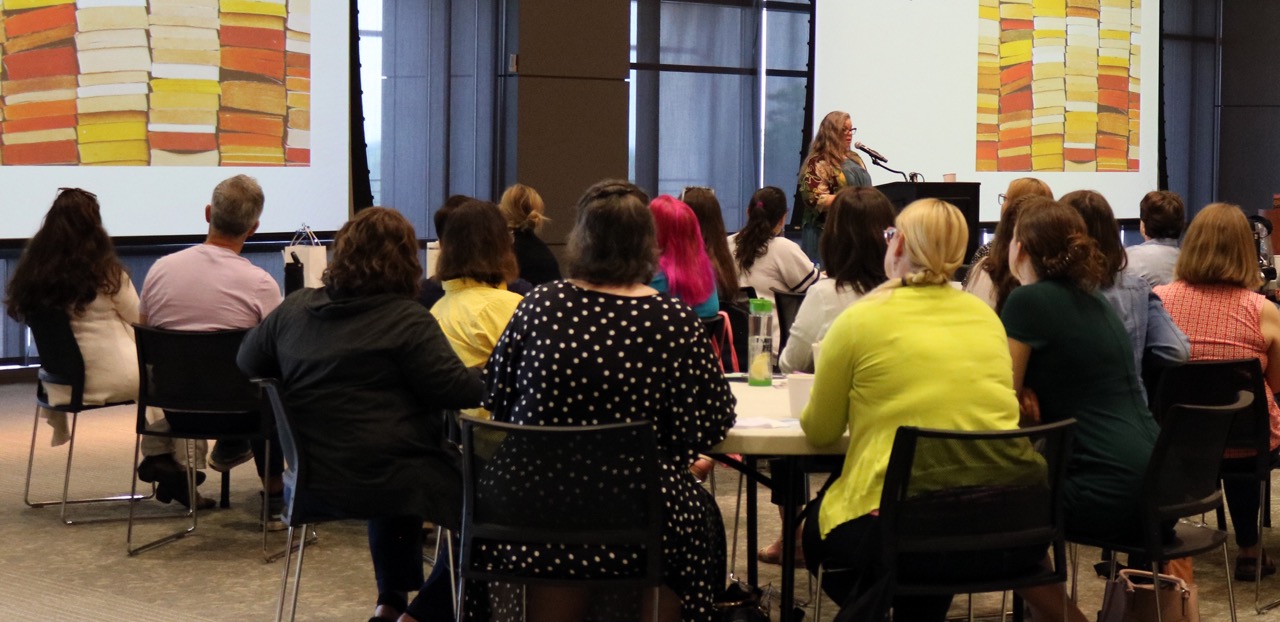
"The NC LIVE Conference was well-organized, and the topics varied to meet attendees needs and interests. Great work!
In-Person Sessions
The in-person day of the conference was held on Friday, May 17 at Cape Fear Community College in Wilmington, N.C.
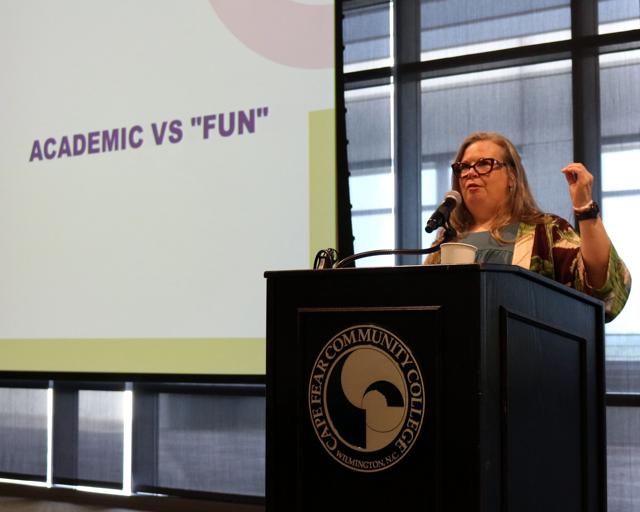 Keynote: Rebecca Tolley
Keynote: Rebecca Tolley
Reframing Wellness: Redefining Sanctuary and Job Boundaries in Libraries
This keynote explored the concept of reframing wellness in the context of historical library services and spaces. Tolley discussed strategies for creating sanctuary spaces while addressing the challenges of job creep by redefining boundaries between work and personal well-being.
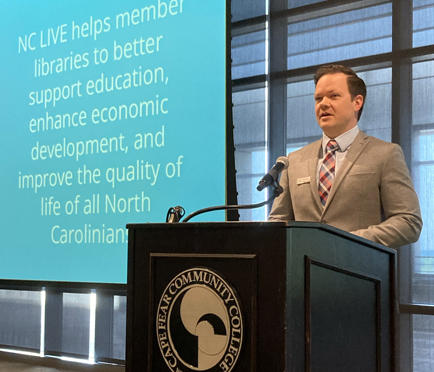 NC LIVE Welcome & Introduction (In-person)
NC LIVE Welcome & Introduction (In-person)
Executive Director Rob Ross welcomes in-person attendees and provides an overview of some of NC LIVE's content, software, and services.
Addressing Veteran Needs Through Library Partnership
Amy Wilson, LIS student at UNC Greensboro
Amy Wilson is working on developing an outreach program to meet Veterans' information needs by creating partnerships between local libraries and veteran organizations. Although North Carolina has one of the largest veteran and active-military personnel populations in the country, it is an often underserved and unaddressed population. Many in this community have unique or unusual needs, limited resources, and require assistance navigating life outside the military. Libraries in this state are positioned to address this diversity of needs through free to low-cost services and programs. Wilson presented her work on this project and discussed easy, free, or low-cost services, programming, and classes that can be created or implemented in your local library.
Community Programming with Eight Dimensions of Wellness
Suzanne Moore, County Librarian at Wilkes County Public Library
Suzanne Moore presented on various resources and opportunities for community partnerships that explore every aspect of wellness, including physical, emotional, social, spiritual, intellectual, financial, environmental, and occupational wellness. The presentation provided attendees with a toolkit of ideas that can be put into practice with audiences of all ages and generations.
Cultivating a Holistic Wellness Collection: A Journey from Concept to Collaboration
Will Ritter, Public Services Librarian at Wake Forest University
Will Ritter presented on Z. Smith Reynolds Library’s journey towards establishing a significant wellness collection. The presentation discussed funding challenges and the curation of a diverse range of resources tailored to the academic community's needs. Key highlights include strategic partnerships with campus entities like the Counseling Center and Health Services, which were instrumental in enriching the collection and promoting holistic wellness. Attendees gained insights into the steps involved in both initiating and developing a wellness collection, the importance of collaborative efforts for enhancing its impact, and the methodologies employed for measuring its effectiveness. This session aimed to provide practical strategies and lessons learned, inspiring library professionals to cultivate similar resources in their institutions, thereby fostering a culture of well-being.
Cultivating Well-Being in Academic Libraries
Jamie Bradway, Preservation Librarian at NC State; Cara Smelter, Executive Assistant to the Director of Libraries at NC State
Jamie Bradway and Cara Smelter presented on the topic of balancing challenges faced by college students, including coursework, relationships, adjustment to campus life, economic strain, social injustice, mass violence, and the continuous impact of COVID-19. According to the National Education Association, "rates of anxiety, depression, and suicidal ideation on college campuses have never been higher." This presentation proposed that colleges and universities must enhance and elevate a culture of belonging and well-being throughout their campus communities. At NC State University, a holistic approach was employed to address students’ mental health needs. The presentation discussed the role that libraries can play in enhancing the well-being of students on college campuses by fostering connectedness, increasing resilience, and reducing anxiety.
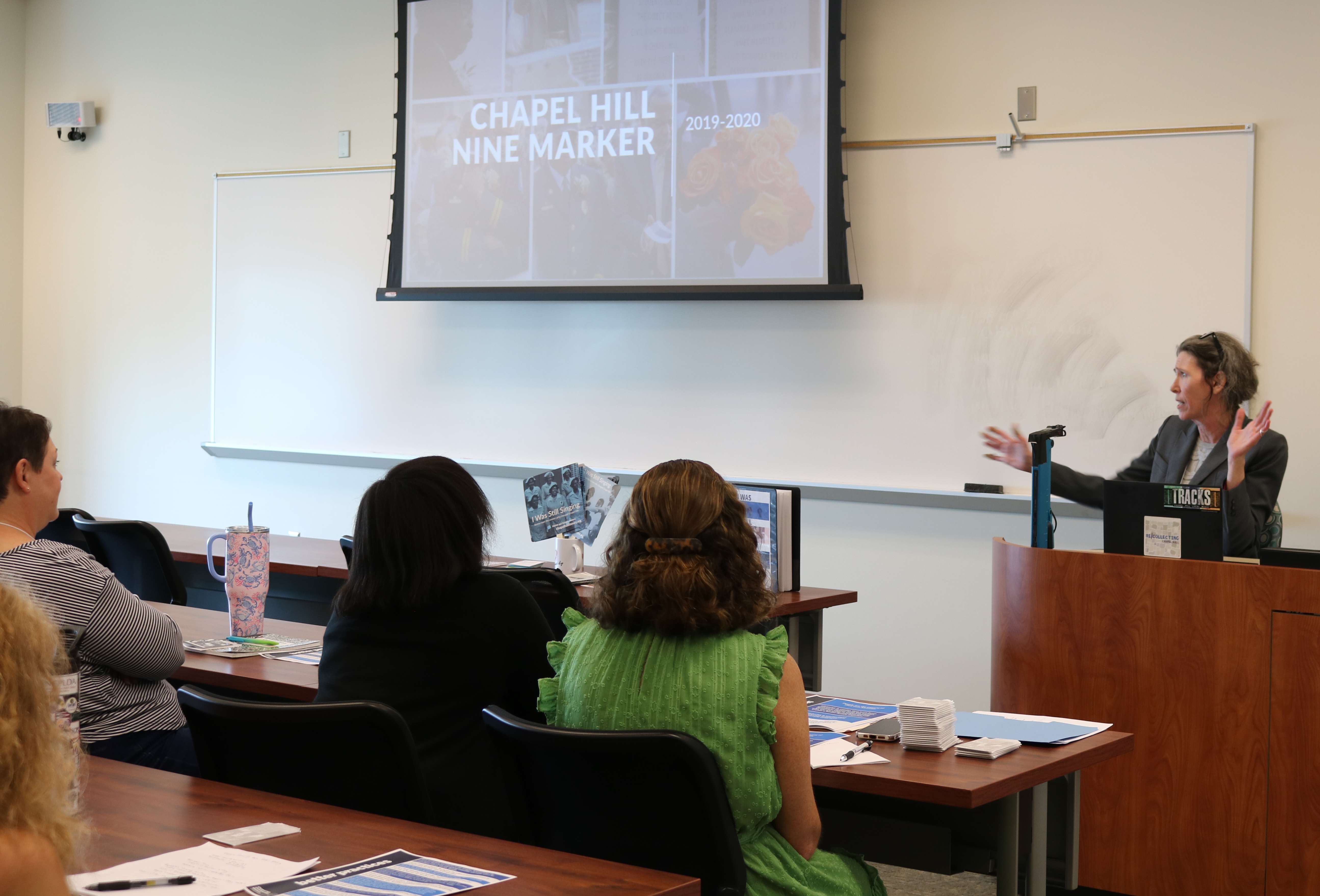 Engaging Community Through Public History
Engaging Community Through Public History
Molly Luby, Community History Coordinator at Chapel Hill Public Library
Molly Luby presented on the library’s efforts to document and share untold, ignored, and erased stories from Chapel Hill's history. This work was an intentional, collaborative co-creation with history makers, historians, local government, and community members. Rooted in racial equity, it sought to flip the traditional model of collecting and sharing history. The program grew out of a 2017 local government task force charged with documenting local civil rights history from the community’s point of view. In the years since, interest and participation in this work continued to grow. In this presentation, history staff walked through how they developed this program and their current practices. They shared several notable history projects, including a podcast, digital exhibits, summer programming, a reparations book club, and much more.
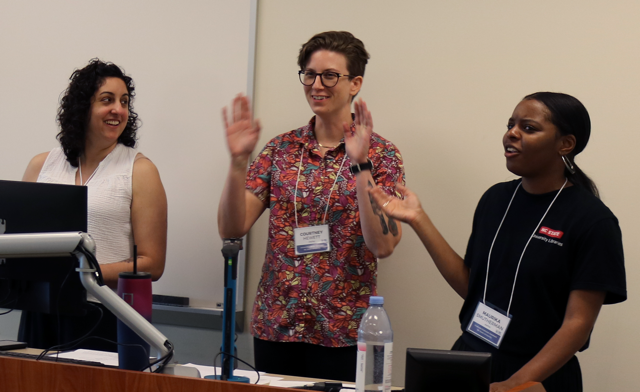 Femme Space: Nurturing Safe Exploration in Gaming, Making, and Digital Media for Femme Identities
Femme Space: Nurturing Safe Exploration in Gaming, Making, and Digital Media for Femme Identities
Lara Fontaine, Community Engagement Librarian at NC State; Courtney Hewett, University Library Specialist at NC State; Maurika Smutherman, Graduate Extension Assistant at NC State
In a society where traditionally male-dominated spaces can often be unwelcoming, Femme Space is designed to create a safe and inclusive environment for individuals with femme identities to explore, engage, and find community in gaming, making, and digital media spaces. This session was dedicated to fostering empowerment, self-expression, and a sense of belonging for femmes who are passionate about these creative and technical pursuits. In this presentation, Lara, Courtney, and Maurika discussed how librarians at NCSU developed the Femme Space series, which consisted of Femme Game Night, Femme Making Night in the Makerspace, and Femme Beat-Making Night. Attendees explored the strategies employed to build strong and supportive communities, emphasizing the significance of connections that extend beyond the event series and contribute to lasting empowerment. Also discussed was how buy-in was secured from administration, the challenges they experienced along the way, and strategies for implementing similar events at other institutions.
From Reading Lists to Wellness Challenges (Lightning Talk)
Erica Derr, Community Engagement Librarian at Catawba County Library System
Erica Derr presented on the Self Care Project using Beanstack in 2021, including how her library did it and what they learned. Additionally, she shared takeaways and ideas on how to make the program work in other libraries. This session ultimately asked of its attendees: if your library uses Beanstack to let patrons track their reading, or to engage with summer learning programs, why not use it to promote health and wellness?
Gardens, Farmers' Markets, & Libraries: Cultivating Connections and Collaborations
Mark Taylor, Librarian at High Point Public Library; Noah Lenstra, Associate Professor at the UNCG Library & Information Science Program
Mark Taylor presented on his collaboration with Noah Lenstra on the foundational role of food in health and wellness. Since 2014, High Point Public Library has worked with an ever-expanding number of community partners to host a teaching garden, a farmers market, and a variety of free educational classes. This session explored how cultivating and leveraging community connections can support gardening, farmers markets, and more to increase impact, support lifelong learning, and contribute to sustainable community food systems. Attendees were invited to join a conversation about how they, too, could get involved to make a difference.
The IL Jam Sessions: Developing a Community of Practice for Revitalizing Information Literacy Instruction
Brittany O'Neill, Information Literacy Librarian at UNC Wilmington
When instruction demands are high, librarians often have limited time to prepare for classes, let alone come up with novel ideas for instruction. How can we reinvigorate our creativity and spark new pedagogical approaches in a sustainable way? Presenter Brittany O’Neil, Information Literacy Librarian at UNC Wilmington, introduced a professional development series on topics ranging from citation justice to teaching with generative AI. During these sessions, librarians demonstrated active learning opportunities on a specific theme and considered scaffolding, the ACRL Framework for Information Literacy, as well as adapting lessons to fit different audiences. Attendees left the session with ready-to-use lessons plans relevant to their instruction.
The Kids Are Alright: Supporting Student Parents and Caregivers
Jennifer Arnold, Director of Library Services at Central Piedmont Community College
Jennifer Arnold provided an overview of the research and best practices for ways academic and community college libraries can support student-parents and caregivers. She offered examples of services such as lactation spaces and family friendly study rooms that remove barriers to library usage and support academic success of parents and other caregivers. Additionally, her presentation examined the broader issues that student-parents and caregivers face on campus and how services can be designed to be more inclusive to these students.
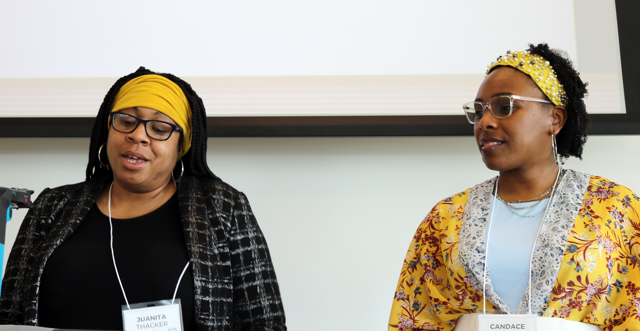 Let's Talk: When a Soft Command Firmly Pushes Your Boundaries
Let's Talk: When a Soft Command Firmly Pushes Your Boundaries
Melody Rood, Student Success and Open Education Librarian at UNC Greensboro; Juanita Thacker, Information Literacy Lecturer and Librarian at UNC Greensboro; Candace Jacobs, STEM Liaison Librarian at UNC Greensboro
This group presented on how capitalism's pursuit of profits shapes employee identity and expectations in the workplace, including in higher education. The presentation proposed that the impact of fervent capitalism contributes to a toxic workplace culture within academic institutions, making sustainable work/life balance practices inaccessible. From the outside, academic institutions and corporations appear very different: businesses remove barriers to profits while educators remove barriers to learning. However, in terms of workplace practices around employee wellness, the differences begin to diminish. As a society and profession, it is necessary to move beyond the idea that taking on more responsibilities beyond the 40-hour workweek is a reasonable litmus test of workplace competency and commitment. The presentation discussed sustainable solutions for library worker wellness where radical self-care begins, by addressing the very systems that made it a necessity.
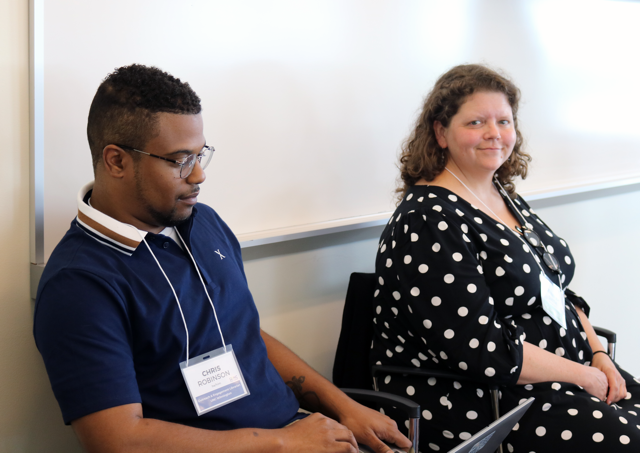 Mindfulness in the Library: A Panel and Practice
Mindfulness in the Library: A Panel and Practice
Lisa Coats, Library Assistant at New Hanover County Public Library; Chris Robinson, Outreach and Engagement Librarian at UNC Wilmington; Jennifer Sixkiller, Health and Human Services Librarian at UNC Wilmington; Jennifer Smith, Reference and Instruction Librarian at Alamance Community College
This panel presented on their experiences providing mindfulness programming to their communities. Attendees experienced a variety of mindfulness practices, led by the presenters and were able to take away many ideas for bringing mindfulness into their own personal and professional lives.
Using TILT to Create Intentional DEI Practices to Enhance Student Experiences in Library Instruction
Brittany N. Champion, Outreach Librarian at Furman University
Brittany Champion believes that library instruction is a significant community-building element of an academic librarian’s role, as it serves as an avenue to connect with students, develop stronger librarian-faculty relationships, and functions as an outreach component. To create an inclusive space, each instruction session should offer elements that welcome accountability and ensure successful research practices that will later contribute to scholarly conversations. Her session focused on her experiences integrating intentional DEI practices into her own instruction, using Transparency in Learning and Teaching (TILT), a teaching framework developed by Dr. Mary-Ann Winkelmes. Using the fundamentals of this framework, combined with instructional tools and interactive tools, Champion detailed ways to improve library and student relationships, help students achieve stronger research skills that will transfer beyond their undergraduate experience, and how to encourage students to invest in their research interests using their background experience.
Wellness as a Verb: How to Support Staff Wellness as a Manager
Garrison Libby, Head of Research Services at UNC Charlotte; Tracie Krumbine, Patron Services Manager at UNC Charlotte
Wellness isn’t a binary state, but rather a set of intentional actions to support overall health. Within the library, managers play a critical role in supporting wellness among staff. Library Managers Garrison Libby and Tracie Krumbine focused their session on strategies managers can incorporate to create an environment that centers staff wellness. Activities discussed included: creating flexibility in working conditions, conducting stay interviews with staff, providing opportunities for staff to build new skills, and team building. These strategies can promote a collaborative and positive culture, even when staff time and resources are limited. Additionally presenters shared information for supporting your own wellness, particularly when dealing with the challenges of managing.
Virtual Sessions
The virtual day of the conference was held on Monday, May 20, 2024. The full virtual schedule is available here.
Keynote: Meredith Farkas
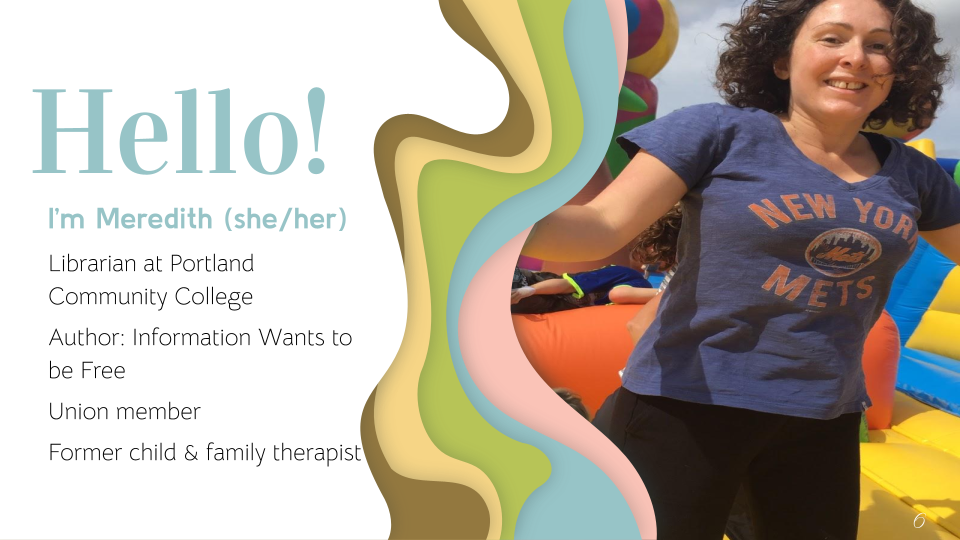
Building Collective Wellness with Slow Librarianship
If the pandemic taught us anything, it’s that our neoliberal and individualistic achievement society is not designed to support the common good. Achievement culture encourages us to chase external validation by putting the focus on innovation and competition over collaboration and collective care. Many of these dynamics are at play in our own profession, leading to toxic cultures of scarcity, low morale, burnout, and significant harm to BIPOC library workers and patrons. We have the power to imagine new futures that will equip us to better serve our patrons and support our collective well-being. Slow librarianship focuses on relationship-building in our communities, values-driven work, quality over quantity, solidarity, antiracism, and reflective practice. In this keynote, Meredith Farkas described slow librarianship, how it connects to wellness, and how we can adopt slow practices to create healthier organizations.
Addressing Trauma for Archival Workers
Shira Greer, LIS Student, University of North Carolina at Chapel Hill
In recent years, archivists have expanded their approach to working with donors, students, and researchers to include trauma-informed care and an acknowledgement that working with archival materials can cause harm to both archival professionals and archival users. A holistic trauma-informed approach can create archival experiences based in collaboration, mutuality, and empowerment. Using Tolley’s six guiding principles of trauma-informed approaches in library services, this presentation analyzed how the University of Richmond’s Race & Racism Project addressed trauma for archival workers participating in the summer fellowship program between 2017 and 2019. The project sought to create a digital collection of archival material and oral histories to address the university’s history, with undergraduate student workers driving the project’s research agenda. This presentation demonstrated how the project worked to find a transparent and supportive path through potential harm for students delving into racist institutional history at a predominantly White institution.
Black Womxn & Librarianship: Cultivating Wellness and Safe Spaces
Jazmyne Baylor, Research & Instruction Librarian at Western Carolina University; Brittany Champion, Outreach Librarian at Furman University; Tiffany Henry, Discovery Cataloger at UNC Greensboro
There is a growing dialogue regarding Black womxn’s wellness and safety in professional and public spaces, including libraries. With the growing media attention on the harm that institutions are causing Black womxn, it is beyond time for our profession to address how they can support women and femmes of color during difficult times. This program featured conversations between library workers who shared their experiences and advice on prioritizing wellness and cultivating safe spaces for all womxn of color. Presenters provided a space at the end of the conversation for attendees to ask questions.
Building Harm Reduction Programs at Your Library
Sarah Kramer, Youth Services Manager at Wake County Public Libraries; Jess Epsten, Digital Inclusion Specialist at NC State University
Sarah Kramer and Jess Epsten presented on the role of public libraries in public health projects and solutions. The presentation explored how library staff can partner with other government departments and community organizations to keep people safe and prepared as community needs shift, including the introduction of Naloxone/Narcan programs. This presentation focused on lessons learned from proposing and planning harm reduction programs at Durham Public Library and Wake County Public Libraries.
Ctrl+Alt+Delete: Restarting Your Academic Library Career with Clarity
Kate Silton, Electronic Resources Librarian at Wake Forest University; Carlos Grooms, Research & Instruction Librarian at North Carolina A&T State University
Many library professionals contemplate career changes, driven by desires for growth, new challenges, or better alignment with personal values. Transitioning to a new job, while exciting, can be a daunting experience. Unfamiliarity, uncertainty, and self-doubt can trigger anxieties and impact mental well-being. This presentation addressed these concerns, and offered strategies to navigate a career shift while prioritizing your mental health. Kate and Carlos, academic librarians from different career stages and areas, shared their personal experiences with job transitions, focused on both professional and personal well-being.
Cultivating Resilience in College Students with a Library Wellbeing Collection (Lightning Talk)
Sydney Adams, Outreach and Engagement Librarian at Davidson College; Ashley Mills, Special Projects and Assessment Librarian at Davidson College
College students commonly experience feelings of stress and anxiety during their academic careers. Although college students will experience and respond to stress differently, academic libraries are positioned to support students through periods of tension by offering resources that help students build resilience to cope with difficult feelings. At Davidson College, we have curated a Student Wellbeing Collection to encourage students to take moments for themselves and prioritize their wellbeing during times of stress. This collection includes books on topics such as meditation, time management, and financial literacy; a board game reference collection for in-library use; and in-house wellness items including seated ellipticals, therapy lamps, fidgets, and puzzles. In this presentation, we will talk more about how we developed this collection and plan to promote it to our campus community.
Diversifying Your Collection
Cha-Quita Reyes Tercero, Instruction & Technology Librarian at Stanly Community College
It is easy to diversify a library’s collection. It takes time, patience, community, and relationship building. A library’s collection should reflect the community, but it should reflect the world too. Libraries are a safe place for learning, understanding, and questions, therefore, it is important for every patron to see themselves in their library and the collection. The collection is never complete and just like the world it will constantly change. Maintaining a diverse collection isn’t hard and it is worth the effort. This presentation included instructions for where to start with a diverse collection, how to determine what works for a library, and collecting data on the community for the collection.
Don't Fear the Reaper: Discussing End-of-Life Wishes with Loved Ones
Carrie Forbes, Liaison Librarian to the ECU College of Nursing and Undergraduate Programs at East Carolina University
Death and the end-of-life can be a scary topic to navigate not only for yourself, but also with friends and loved ones. Using insight and training as a medical librarian, death doula, and hospice volunteer, Carrie shared effective ways to teach people how to confidently communicate their end-of-life care preferences. During this session, Carrie provided practical tips and guidance about how you can help your loved ones by having specific documents and information in place ahead of time. Additionally, participants learned how using a free document called "The Five Wishes" can serve as a valuable tool in initiating meaningful conversations with family and friends about their own personal preferences for the end-of-life.
The Ethical Tightrope: Balancing Library Values & the Parents' Bill of Rights Patron Privacy Challenges
Allison Sills, Instructional Librarian at Central Carolina Community College
Allison Sills, Instructional Librarian at Central Carolina Community College, presented on the critical dilemma faced by community college libraries in North Carolina as they navigate the intersection of patron privacy and the Parents’ Bill of Rights. Since the bill's enactment in December 2023, libraries have been compelled to disclose patron checkout history, posing a significant ethical challenge. This session delved into the historical context, the ethical stance of the American Library Association (ALA), and the intricacies of the Parents’ Bill of Rights. It aimed to provide insights into how to uphold professional ethics while meeting legal obligations.
“Have You Tried Just Focusing?” Productivity, Wellness, and Work/Life Balance for Library Workers with ADHD
Amy Harris Houk, Assistant Dean for Teaching and Learning at UNC Greensboro; Ian McLaughlin, LIS Student at UNC Greensboro
Approximately 8.7 million adults in the US have been diagnosed with ADHD. This number likely includes you and/or at least one of your colleagues, though the actual number of people living with ADHD could be even higher, since many people, especially women, are not diagnosed until adulthood or ever. Contrary to librarian stereotypes, library work can be a great fit for folks with ADHD, especially positions with opportunities for collaboration and innovation or varied or active work, but other aspects of library work can be difficult. This presentation discussed how library jobs' physical and social environments can help library employees with ADHD thrive and strike a healthy work/life balance.
“It Ain’t Easy Bein’ Green”: Ideas for Environmental Wellness Programming in Community College Libraries (Lightning Talk)
Morgan Pruitt, Outreach and Assessment Librarian at Central Carolina Community College
As discussions of climate change and declining biodiversity circulate the news, environmental wellness can feel impossible to achieve. Not only does this create a sense of grief over the state of the environment, but it can also undermine a sense of environmental efficacy. However, incorporating environmental wellness programming into community college libraries can promote community conservation activities. Community college libraries are uniquely situated to engage and empower students and faculty as well community members around this topic. This lightning talk identified the importance of environmental wellness programming in community college libraries and highlighted ideas for meaningful programming.
Making, Managing, & Marketing a Wellness Collection in an Academic Library
Maia Dickinson, Public Services Assistant at Wake Forest University; Jemma Johnson, Research Support Assistant at Wake Forest University
Libraries of all types offer so much more than just the books they hold. Many academic libraries are now asking how their spaces and collections can help the entire student, rather than solely catering to their intellectual needs. This session explored the practical aspects of creating, organizing, and promoting a diverse range of resources–both media and physical objects like balance boards and foam rollers–that contribute to the mental health and physical well-being of a student community. From collection development strategies to effective marketing techniques, the presenters provided actionable insights to empower libraries to become important hubs for holistic community support.
Mental Health First Aid & the Public Library
Gina Petrie, Adult Services Librarian at Charlotte Mecklenburg Library
In May 2023, the Charlotte Mecklenburg Library, University City branch, offered free Mental Health First Aid (MHFA) training to public library patrons and staff. The MHFA program is a nationally recognized, evidence-based course that teaches individuals how to identify, understand and respond to signs of mental illnesses and substance use disorders. We know that the rates of anxiety and depression have skyrocketed since the beginning of the pandemic. It is crucial that the library play a role in addressing the resulting challenges. This program described the process of bringing Mental Health First Aid to the library community. The presenter outlined the steps involved in securing funding, identifying and partnering with a local MHFA expert and trainer, advertising, and implementation.
"An Occupational Hazard:" Secondary Trauma in Archives (Lightning Talk)
Hannah Nicholson, LIS Student at UNC Chapel Hill
Experiencing a sense of personal connection with archival materials can be rewarding for archivists, but it can also be “an occupational hazard." Archivists who experience this sense of connection with records that depict trauma can sometimes develop secondary trauma. Secondary trauma has long been discussed in relation to medical professionals, but the conversation regarding how archival materials can be a source of secondary trauma is still relatively new. In particular, discussion is needed concerning what measures can be put into place to support archivists experiencing secondary trauma. During this talk, Nicholson discussed how to apply strategies in line with trauma-informed practice, which is a framework that seeks to diminish the frequency of distressing interactions and retraumatization in the workplace at archival institutions.
Supporting NC College Student Resiliency Using LibGuides as an OER (Lightning Talk)
Rachael Pontillo, Library Assistant at UNC School of the Arts; Christy Drake, Library Assistant at UNC School of the Arts
Academic libraries have the unique responsibility of supporting college students through the challenges of collegiate level coursework and the beginning of their independent adult lives. Finding new ways to promote student access is imperative after the effects of COVID-19. UNCSA received funding to create several OER LibGuide templates that UNC campus libraries can adapt to their own student population. Themes covered during the creation of the LibGuide templates cover resiliency-based topics such as wellness, mental health, and peer counseling. The presenters utilized a set of common eBooks purchased specifically for this grant in addition to adding relatable resources available through NC LIVE to build LibGuides. During this session, presenters reviewed the overall processes and outcomes of this project, including its successes and challenges.
Supporting Staff Self Expression Through Art
Laura Bright, Collection Strategist and Assessment Librarian at East Carolina University
Creating art helps to lower stress levels, reduce anxiety, and promote feelings of self-empowerment. Engaging in creative activity can promote feelings of success at work, and the arts help to strengthen relationships and promote understanding in communities. During this session, Laura gave practical examples of art projects that promote self-expression and mindfulness which can be used for staff art clubs and professional development events. The presenter explained how to plan for and present this programming. Laura also shared advice for starting and promoting library staff art clubs, based upon the presenter’s own experience leading an art club at their university library, and shared some of their outcomes and successes.